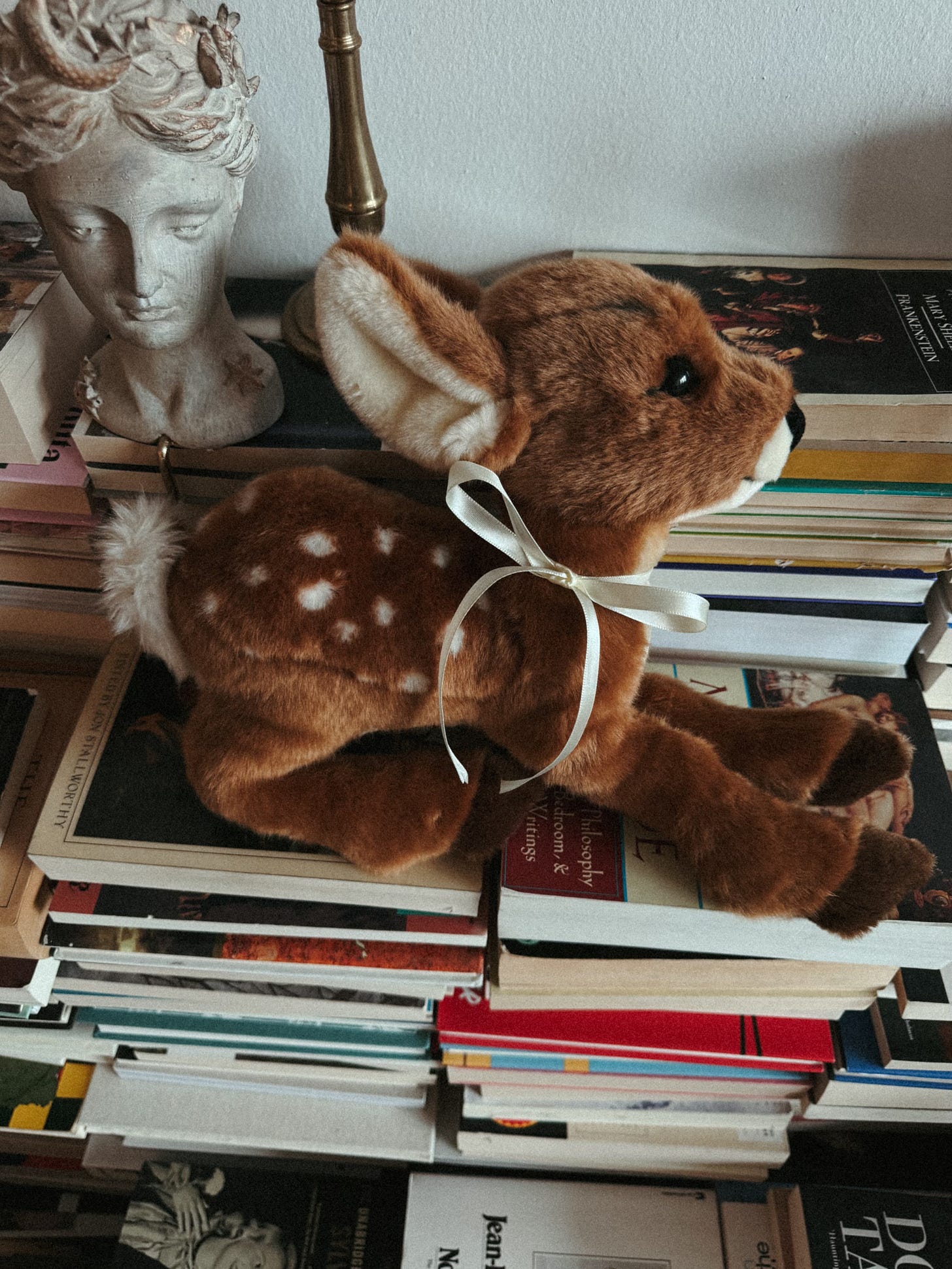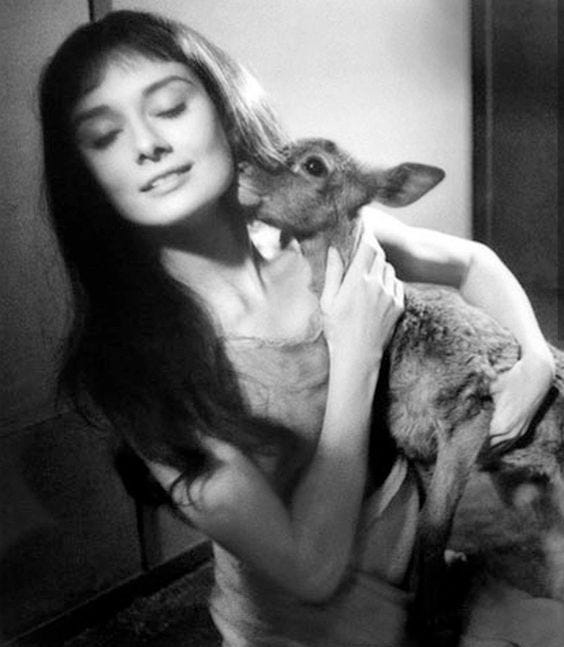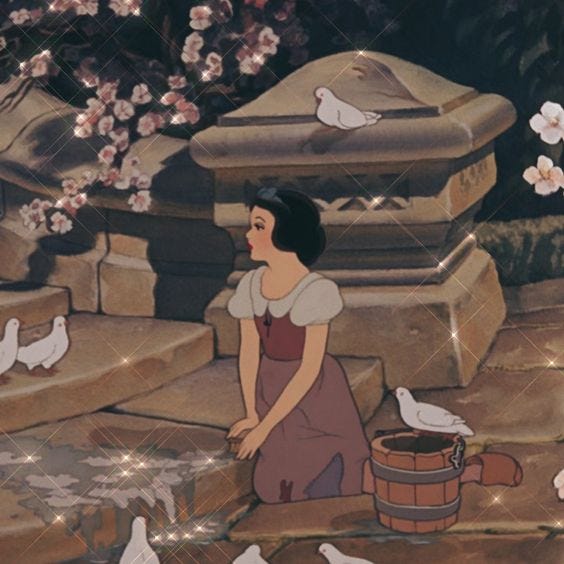love letter to fawns, the almond mom, wellness and sex fatigue, and the stanley water bottle craze
Hello.
A little love letter to woodland creatures, then some news.
The other day I found a Steiff fawn plush for 50% off and I just about screamed. I had to have her.
Does anyone else share a similar affinity for woodland creatures? Specifically fawns, bunnies, etc.
Woodland creatures, particularly fawns, embody a natural elegance and grace that is captivating in its simplicity and purity. The delicate features of a fawn, with its soft, dappled coat and wide, innocent eyes, evoke a sense of serenity and a deep connection to the untamed beauty of the forest. These gentle beings move with a lightness and poise that seamlessly blend into the tranquil woodland surroundings, symbolizing the harmonious balance and delicate beauty of nature.
Fawns also hold a significant place in literature, symbolizing various themes depending on the context. Traditionally, fawns are seen as symbols of innocence, purity, and new beginnings, given their youth and tender appearance. They often represent the untouched and gentle aspects of nature, embodying a sense of vulnerability and grace.
In mythology and folklore, fawns are frequently associated with deities of forests and nature, like the Greek god Pan or the Roman deity Faunus, both of whom have traits of goats and humans and are connected to the wilderness and pastoral life. These connections reinforce themes of natural harmony, fertility, and the primal, untamed aspects of nature.
In children's literature, fawns often appear as characters that embody innocence and the need for protection, reflecting the journey from innocence to experience. A famous example is Bambi, a young deer in the Disney film adapted from Felix Salten's book "Bambi, A Life in the Woods." Bambi’s character development through various trials mirrors the journey of growth and learning, facing the realities of life in the wild.
Fawns in literature can also symbolize fragility and the transient nature of life. Their delicate presence in stories often serves as a reminder of the precarious balance in nature and the need to protect and cherish the natural world.
Maybe another time I’ll share my affinity for lambs and baby cows. And birds.
I feel like Snow White.
News:
The narrative offers a compelling exploration of the evolving understanding and treatment of ADHD, highlighting the complexities of diagnosis, the nuances of gender differences, and the profound impact of personalized care. Through the pediatrician's reflections, it underscores the transformative power of recognizing and addressing ADHD, not just as a medical condition, but as a multifaceted life experience impacting individuals and families across generations.
-Does Journaling Actually Improve Mental Health?
This narrative reflects on the therapeutic potential of journaling, particularly during Sylvia Plath's tumultuous life, and examines the broader implications and limitations of this practice for mental health. It delves into the history and development of therapeutic journaling, its benefits and pitfalls, and the stark reality of mental health care systems. While journaling offers a temporary solace for many, including Plath, the piece argues that it cannot replace the need for professional care and highlights the challenges faced by those seeking mental health support. It serves as a reminder of the complex interplay between personal coping mechanisms and the broader societal responsibility to provide accessible and effective mental health care.
The passage reflects on the societal pressures and challenges surrounding body image and diet culture, particularly focusing on the "almond mom" phenomenon—a term popularized on TikTok to describe parents who project their own food and body insecurities onto their children. The author empathizes with these mothers, recognizing that their behaviors are often a result of their own unaddressed issues with body image and societal norms. While acknowledging the harm of such attitudes, especially in shaping children's perceptions of food and self-worth, the author also highlights the broader societal and cultural factors at play. The lack of accessible treatment for disordered eating and body dysmorphia, especially in marginalized communities, and the unrealistic standards perpetuated by media and culture, contribute to this cycle of insecurity and judgment. The piece ultimately calls for compassion and understanding, recognizing that both parents and children are victims of these deep-rooted societal problems. The author hopes for a future where families can enjoy food without guilt or fear, breaking the cycle of body negativity and embracing acceptance and joy.
-I’m Over Wellness. Long Live The January Burger.
This passage humorously addresses the typical January mindset of self-improvement and diet culture, challenging the often rigid and restrictive approaches to New Year's resolutions. The author playfully critiques the common tendencies of detoxing, dieting, and intense exercising that accompany the start of a new year, suggesting that these practices may not always align with true desires or needs. Through vivid imagery and cultural references, they emphasize the pressures to conform to societal standards of health and beauty, questioning why self-improvement often equates to becoming "slimmer or leaner." The piece advocates for a more balanced and less punishing approach to self-care, highlighting the importance of listening to one's body and allowing indulgences, like enjoying a burger, without guilt. It invites the reader to reconsider the rigid norms of New Year's resolutions, proposing a more relaxed and enjoyable approach to personal well-being.
-The Stanley Water Bottle Craze Explained
The passage examines the cultural and social phenomenon surrounding the popularity of Stanley water bottles, highlighting their status as a trendy accessory and collector's item beyond their practical use for hydration. It delves into the irony of their overconsumption in light of their original purpose to reduce plastic waste, suggesting that their appeal is tied to broader wellness and lifestyle trends.
-Going Freelance In 2024? Here’s How To Make It Work
The passage offers valuable insights into the less conventional yet increasingly viable career path of full-time freelancing. It emphasizes the importance of defining a niche, sharing expertise publicly, nurturing a professional network, diversifying income sources, establishing credibility, being reliable, continuously upgrading skills, learning from mistakes, prioritizing joy, and the ability to say no. These lessons, drawn from a decade of experience in marketing consultancy and advice from other successful freelancers, highlight the unique dynamics of freelancing and the strategies for sustaining and growing in this career choice. The narrative underscores freelancing not just as a stopgap or side hustle but as a fulfilling, long-term career option with its distinct set of challenges and rewards.
-Believe Me When I Say I Don’t Miss Sex
The passage reflects on the author's journey from a sexually adventurous youth, as detailed in a 1995 Cosmopolitan article, to a more subdued and reflective stage in her mid-60s. It captures her experiences and transformations, from the highs of sexual escapades and the pain of loss and heartbreak, to a current state of contentment with a simpler, quieter life. Now valuing safety and independence, she reminisces about her past with a mix of nostalgia and relief, contemplating the possibility of rekindling her sexual energy but with a newfound caution and desire for stability. The narrative highlights the complexities of aging, changing priorities, and the enduring search for fulfillment and meaning in life's different stages.
-How To Actually Make Friends As An Adult IRL
Meeting and making new friends as an adult intertwines logistical challenges and emotional vulnerabilities, requiring one to navigate busy schedules and the daunting task of initiating conversations. Successful friendship-building hinges on shared interests, positive interactions, and the courage to express mutual appreciation, transforming acquaintances into meaningful connections.
-24 Tips To Make 2024 Brighter
The 24 tips from Life Kit offer a diverse array of practical advice for improving daily life, from immediate action on small tasks and mindful eating, to efficient laundry practices and expressing platonic affection. These tips, encompassing health, productivity, finance, and relationships, aim to enhance overall well-being, save time and money, and strengthen personal connections.
See you tomorrow.
Bye<3






